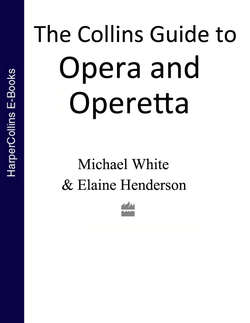Читать книгу The Collins Guide To Opera And Operetta - Michael White - Страница 45
ОглавлениеThe Rape of Lucretia
FORM: Opera in two acts; in English
COMPOSER: Benjamin Britten (1913–76)
LIBRETTO: Ronald Duncan; after André Obey’s play, itself based on Livy and Shakespeare
FIRST PERFORMANCE: Glyndebourne, 12 July 1946
Principal Characters
Lucretia, Collatinus’ wife Mezzo-soprano
Collatinus Bass
Tarquinius, ruler of Rome Baritone
Junius Baritone
Male Chorus Tenor
Female Chorus Mezzo-soprano
Synopsis of the Plot
Setting: Rome; 510 BC
ACT I In the army camp Tarquinius, Collatinus and Junius are drinking steadily and complaining about the general untrustworthiness of women, with the exception of Collatinus’ wife, Lucretia, who is known to be absolutely and unshakeably faithful. This assertion provokes Tarquinius, who rides furiously to Rome with the sole intention of destroying Lucretia’s reputation. When Tarquinius arrives at her home, Lucretia welcomes him, rather uneasily, and offers him hospitality.
ACT II Tarquinius creeps into Lucretia’s room and she, sleepily imagining it to be her husband, responds to him before realising the truth and struggling, in vain, to prevent him from raping her. The next day Lucretia sends for Collatinus, who quickly learns the truth from her attendants. Collatinus reassures his wife of his love for her but Lucretia’s shame is too great for her to bear and she stabs herself to death.
Music and Background
The Rape of Lucretia followed Peter Grimes in Britten’s output but was written for far more modest resources – eight voices and a chamber ensemble of thirteen instruments – which reflect a concern for the practical problems of getting opera onto the stage in the years of austerity immediately after the Second World War. The tone of the writing is itself austere, stiff with an emotional restraint that limits the opera’s popularity. But the brilliance with which Britten draws from these small resources ingenious effects like the opening evocation of a sultry Italian night – complete with bullfrogs and cicadas – is undeniable, and the vividness of this sound-painting more than compensates for moments of monochrome dryness elsewhere.
Highlights
The Male Chorus account of Tarquinius’ night-ride in Act I is tense with excitement. In Act II the most purely beautiful music comes, oddly perhaps, as Tarquinius steals upon the sleeping Lucretia, singing ‘Within this frail crucible of light’.
Did You Know?
The lingering logistical problem with The Rape of Lucretia is why a devoted wife who has been violated against her will should feel any guilt. Stage directors tend to address the issue by implying that she harbours hitherto unrealised desires for Tarquinius – although this doesn’t endear their productions to feminist commentators.
Recommended Recording
Janet Baker, Peter Pears, Heather Harper, English Chamber Orchestra/Benjamin Britten. Decca 425 666-2. Discs that captured Janet Baker on peak form in 1970, with singing of depth and dignity.
